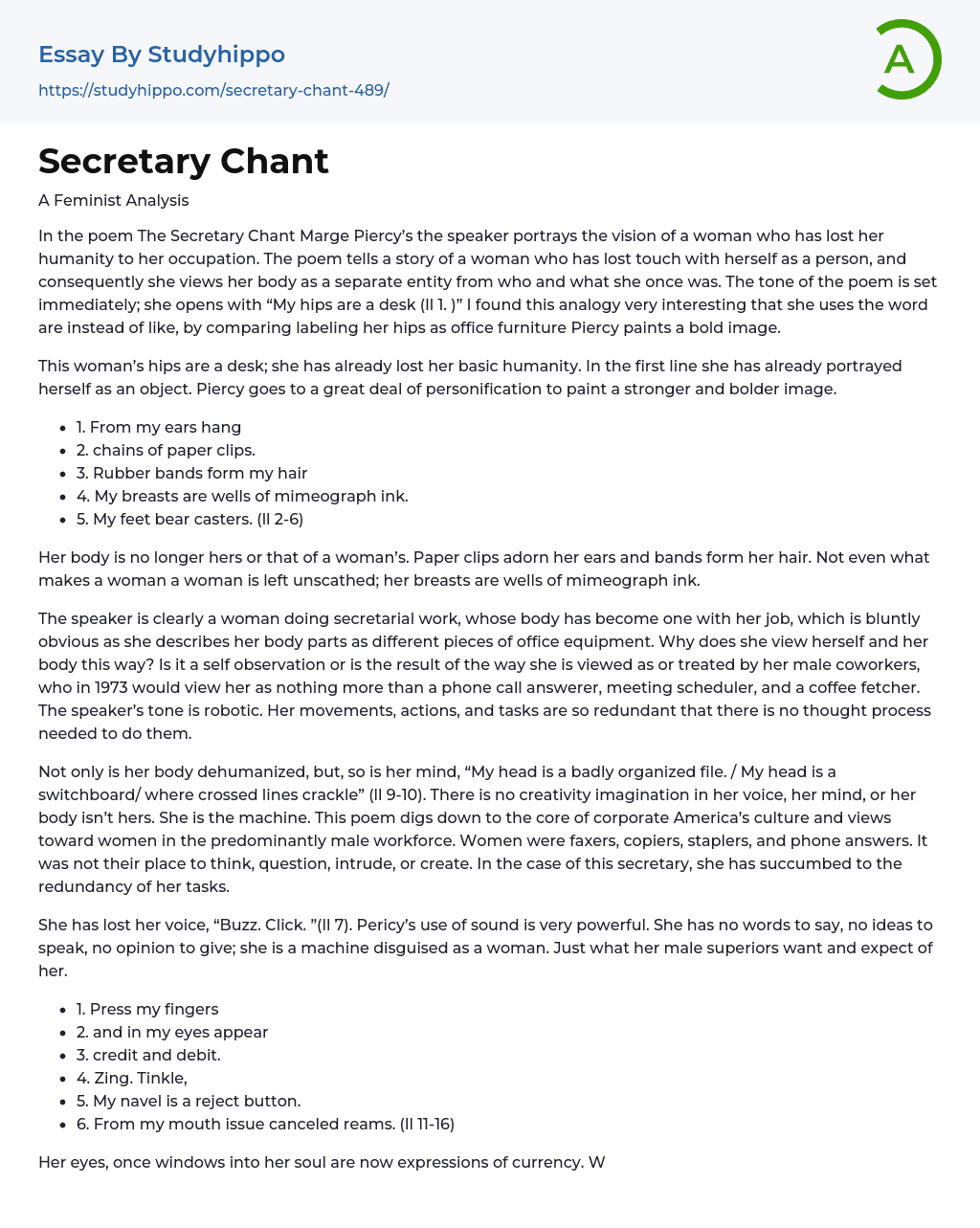In the poem The Secretary Chant Marge Piercy’s the speaker portrays the vision of a woman who has lost her humanity to her occupation. The poem tells a story of a woman who has lost touch with herself as a person, and consequently she views her body as a separate entity from who and what she once was. The tone of the poem is set immediately; she opens with “My hips are a desk (ll 1. )” I found this analogy very interesting that she uses the word are instead of like, by comparing labeling her hips as office furniture Piercy paints a bold image.
This woman’s hips are a desk; she has already lost her basic humanity. In the first line she has already portrayed herself as an object. Piercy goes to a great deal of personification to paint a stronger and bolder i
...mage.
- From my ears hang
- chains of paper clips.
- Rubber bands form my hair
- My breasts are wells of mimeograph ink.
- My feet bear casters. (ll 2-6)
Her body is no longer hers or that of a woman’s. Paper clips adorn her ears and bands form her hair. Not even what makes a woman a woman is left unscathed; her breasts are wells of mimeograph ink.
The speaker is clearly a woman doing secretarial work, whose body has become one with her job, which is bluntly obvious as she describes her body parts as different pieces of office equipment. Why does she view herself and her body this way? Is it a self observation or is the result of the way she is viewed as or treated by her male coworkers, who in 1973
would view her as nothing more than a phone call answerer, meeting scheduler, and a coffee fetcher. The speaker’s tone is robotic. Her movements, actions, and tasks are so redundant that there is no thought process needed to do them.
Not only is her body dehumanized, but, so is her mind, “My head is a badly organized file. / My head is a switchboard/ where crossed lines crackle” (ll 9-10). There is no creativity imagination in her voice, her mind, or her body isn’t hers. She is the machine. This poem digs down to the core of corporate America’s culture and views toward women in the predominantly male workforce. Women were faxers, copiers, staplers, and phone answers. It was not their place to think, question, intrude, or create. In the case of this secretary, she has succumbed to the redundancy of her tasks.
She has lost her voice, “Buzz. Click. ”(ll 7). Pericy’s use of sound is very powerful. She has no words to say, no ideas to speak, no opinion to give; she is a machine disguised as a woman. Just what her male superiors want and expect of her.
- Press my fingers
- and in my eyes appear
- credit and debit.
- Zing. Tinkle,
- My navel is a reject button.
- From my mouth issue canceled reams. (ll 11-16)
Her eyes, once windows into her soul are now expressions of currency. Where there once were words, out come receipts. She is fully mechanized, there are no human facets left.
She is just what they want her to be, a beautiful machine. But, there is a “reject button”(l 15). Maybe there is hope for her to regain her humanity back after
all. What happens if the reject button is pressed? Does she come back to life, or is she simply rebooted like the machine they have made her out to be? She is stripped of all woman and human capabilities. “Swollen, heavy, rectangular/ I am about to be delivered/ of a baby/ Xerox machine. ”(ll 17-20). She delivers copiers not babies. There is nothing left of her, no even the ability to reproduce.
However, the most powerful lines are the ones that end the poem.
- File me under W
- Because I wonce
- was
- a woman. (ll 21-24)
She is aware of what she once was, a woman. The speaker is aware of what her mind, body, and thoughts have become. They are all mechanical components and products of her occupation. Piercy has created a fiercely strong and vivid image of women’s roles in the workplace in 1973. They were there to do all the work that an established man wouldn’t do. And she has lost her humanity because of it.
- Unconscious Mind essays
- Bias essays
- Big Five Personality Traits essays
- Body Image essays
- Mind essays
- Motivation essays
- Phobias essays
- Thought essays
- Adaptation essays
- Adventure essays
- Adversity essays
- Aging essays
- Alcohol essays
- Barbie Doll essays
- Beauty essays
- Care essays
- Carpe diem essays
- Change essays
- Chess essays
- Chicken essays
- Choices essays
- Contrast essays
- Crops essays
- Development essays
- Dream essays
- Evil essays
- Experience essays
- Family essays
- Farm essays
- Fire essays
- First Love essays
- Focus essays
- Greed essays
- Hero essays
- Holiday essays
- House essays
- Housing essays
- Humility essays
- Humor essays
- Hypocrisy essays
- Integrity essays
- Law of Life essays
- Life Changing Experience essays
- Life Experience essays
- Lifestyle essays
- Limitations essays
- Love Story essays
- Mother Tongue essays
- Motherhood essays
- My Neighborhood essays




